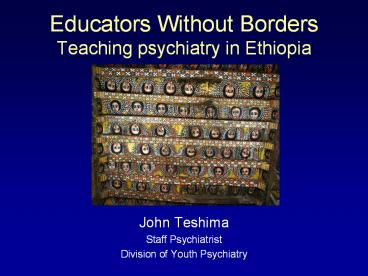Educators Without Borders Teaching psychiatry in Ethiopia - PowerPoint PPT Presentation
1 / 24
Title:
Educators Without Borders Teaching psychiatry in Ethiopia
Description:
describe some of the distinctive features of mental health care in Ethiopia ... How to increase Ethiopia's psychiatrists? ... Ethiopia desperately needs more ... – PowerPoint PPT presentation
Number of Views:103
Avg rating:3.0/5.0
Title: Educators Without Borders Teaching psychiatry in Ethiopia
1
Educators Without BordersTeaching psychiatry in
Ethiopia
- John Teshima
- Staff Psychiatrist
- Division of Youth Psychiatry
2
Learning Objectives
- At the end of this presentation, participants
will be able to - describe some of the distinctive features of
mental health care in Ethiopia - debate the role that educational institutions in
developed countries can play in the training of
health professionals in developing countries - reflect on the challenges and rewards of teaching
psychiatry in Ethiopia
3
Ethiopia
- population 81 million
- half of the population is under 18 years old
- one of the worlds poorest countries
- gross national income per capita is 1190
international dollars - (WHO, 2008)
4
Prevalence of mental health problems
- 12-18.7 for all disorders
- 0.9 for schizophrenia
- 1.8 for bipolar disorder
- 10.8 somatoform disorders
- 2.7-3.7 problem drinking
- suicide rate 7.8 per 100,000
- (Alem, 2001)
5
Mental health beliefs
- most Ethiopians believe that psychiatric symptoms
are due to spiritual causes - they first seek out traditional healers
- typical treatments herbal remedies, holy water,
exorcisms - only when such methods fail, do families seek
modern psychiatric treatment - (Alem et al., 1999), (Alem, 2001)
6
Mental health services
- 54 outpatient clinics
- staffed by psychiatric nurses
- 6 inpatient wards in general hospitals
- only in 4 out of 9 federal regions
- one psychiatric hospital
- Amanuel Hospital in Addis Ababa
- (Desta, 2008)
7
Mental health services
- in 2002, there were 9 psychiatrists
- all practicing in Addis Ababa
- all foreign-trained
8
How to increase Ethiopias psychiatrists?
- continue to send medical graduates abroad for
training - establish a training program locally with
Ethiopian faculty - import a curriculum and faculty from an existing
training program
9
Problems with sendinggraduates abroad
- they dont come back
- there were more Malawian doctors practicing in
Manchester than in the whole of Malawi. - (Broadhead Muula, 2002)
- roughly 80 of Ethiopian medical school graduates
leave to work in other countries - (Araya, personal communication, 2008)
- they come back with knowledge and skills that are
not specific/relevant to the local context
10
Problems with establishing alocal training
program
- not enough faculty to teach and supervise
- challenging for a small number of faculty to
create a curriculum
11
Problems with importing acurriculum and faculty
- curriculum is usually the same as for the
original institution - (Harden, 2006)
- thus can be insensitive or irrelevant to the
local context - focus tends to be revenue generating
- e.g., Cornell University in Qatar, Duke
University in Singapore - (Harden, 2006)
- not feasible in a poor country such as Ethiopia
12
TAAPPs solution
- in 2002, the Toronto Addis Ababa Psychiatry
Project was created - a collaboration between the Departments of
Psychiatry at U of T and Addis Ababa U - combines the numbers and strengths of U of T
faculty with the local experience of Addis Ababa
U faculty - U of T faculty providing their services pro bono
13
Format of TAAPP
- teams of two psychiatrists and one resident from
U of T spend 1 month each in Ethiopia - each team collaborates with the Addis Ababa
faculty to develop a curriculum - 3 trips per year initially
- trips focus on a specific theme, e.g., Psychotic
Disorders, Child Psychiatry
14
Teaching duties of TAAPP
- formal seminars and workshops 3 afternoons per
week - clinical supervision
- inpatient wards
- outpatient clinics
- emergency department
15
My TAAPP experience
- in the summer of 2007, my wife and I agreed to go
on a TAAPP trip in 2008 - after months of meetings and many hours of
preparation, we left for Addis Ababa on March 8th
16
Formal teaching challengesthe content
17
Formal teaching challengesthe content
- some mental health problems have very different
prevalence rates in Ethiopia - e.g., 1.5 for ADHD
- (Ashenafi et al., 2001)
- only 14 psychiatric medications are available in
Ethiopia - a few typical antipsychotics, a few TCAs,
lithium, valproic acid, a few benzodiazepines,
fluoxetine
18
Formal teaching challengesthe process
19
Formal teaching challengesthe process
- engaging the residents in interactive teaching
methods was initially slow going - teaching in Ethiopia is almost exclusively
didactic - limitations to the classroom environment
20
Clinical supervision challenges
21
Clinical supervision challenges
- high volume of patients to see
- patients were very ill
- treatment and disposition options were very
limited
22
Teaching rewards
- after a warm-up period, the residents did engage
well in interactive teaching - the residents were very quick to implement new
knowledge or feedback on their performance
23
Conclusions
- Ethiopia desperately needs more mental health
professionals - international collaboration is a feasible
approach to developing training programs - teaching can cross borders, languages, and
cultures
24
(No Transcript)































